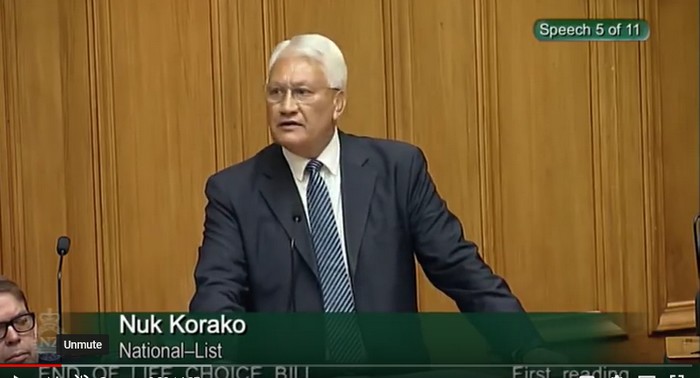
Tēnā koe e Te Mana Whakawā. It was the late Ngati Porou kaumātua Amster Reedy who stated, “We bring people into this world. We care for them right from the time they are conceived, born, bred, in health, sickness, and death. The rituals still exist for every part of their lives.” Those rituals still will exist and we need to have faith in our ancestors. Euthanasia is foreign to Māori and has no place in our society.
In all my life, raised as a Ngāi Tahu Māori, I have never heard or known of a Māori concept that validates assisting dying. Witnessing the death of a whānau member is as intimate as it gets. To watch a painful death can be shattering; the indignities we may have to see our loved one suffer—unable to undertake the most basic human functions without support, watching their agony, feeling their helplessness and, often, their feeling that they are being a burden on their whānau—yet this is only part of the process. There is another side to death; that is the whānau side.
But death has never been a final ending for our people. It merely signifies the beginning of the journey to Te Rerenga Wairua and then onto the ancestral home of Hawaiki nui, Hawaiki roa, Hawaiki pāmamao. It is a life in the afterlife, where we gather once more with our tīpuna and our departed whānau, members, and friends.
The process of dying, for us, is a process of whānau. We hear of terminal illness inside the whānau. We know the time has come to mobilise and gather. We give the immediate whānau our physical, spiritual, and, if needed, financial support. The process of death is not just about a loved one, it’s also about our whānau. This process is an essential component of binding our whānau together. The act of caring for a whānau member is a process of learning, of grieving, of laughing, of despairing, of reminiscing, and of coming to that moment of peace when we can finally let them go. This process of death is as much for the living as it is for the dead. Many Māori see this as an essential expression of taha wairua [the spiritual side], or being a part of something that is greater than ourselves. The final act of dying is the point where the ancestors come to take that loved one home. It is a moment of extraordinary sadness but also joy, as we become aware that an ancestor is now in the room with us to accompany the loved one on their final journey.
In the debates throughout the country that have preceded this tonight, Māori voices have been few and far between because some Māori choose not to discuss such things and fear that their fundamental beliefs are treated as native superstition. To me, assisted dying is to fast-forward a process that ultimately denies our loved one the chance to be taken to their ancestral home and is, instead, left in limbo, on their own, in a transitional afterlife until their time finally arrives.
The real challenge is to ensure all whānau across Aotearoa have access to the full range of palliative care available to ensure that we can ease the passing of our loved ones and the burden of care that falls upon whānau, without resorting to artificially ending their life. Then, we will truly, here, have succeeded. On that basis, I cannot support this bill.
Āpiti hōno, tātai hōno, rātou ki te hunga mate, ki te hunga mate ki a rātou; āpiti hōno, tātai hōno, tātou ki te hunga ora, ki te hunga ora ki a tātou.
[The lines are joined and linked, they to the dead and the dead to them; the lines are joined and linked, we to the living and the living to us.]
Let the dead be the dead and the living be the living. Kia ora tātou.


